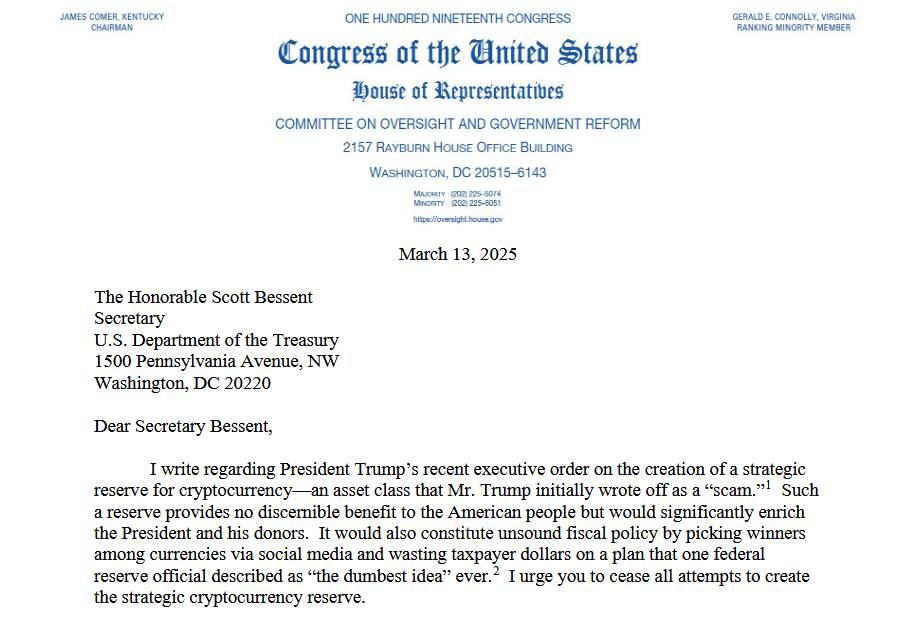A recent clash in U.S. politics has put the spotlight on cryptocurrency, with House Representative Gerald E. Connolly of Michigan challenging a proposal from the Trump administration to establish a strategic reserve of cryptocurrencies. In a pointed letter to Treasury Secretary Scott Bessent dated March 13, Connolly urged the Treasury to abandon any plans that could lead to a national crypto reserve, emphasizing that such efforts would not benefit the American public and could be riddled with conflicts of interest linked to President Trump.
Connolly was particularly critical of the idea, arguing that investing taxpayer dollars in the speculative world of cryptocurrencies like Bitcoin is not only unwise but could lead to an unjust enrichment of the president and his allies. He highlighted comments from the Federal Reserve that labeled this initiative as “the dumbest idea ever,” asserting that there is no strategic need for the U.S. to dive into the volatile cryptocurrency market.
In his correspondence, Connolly made clear that he sees no rationale for creating a reserve that would act as a backup for cryptocurrency speculators. He is concerned that such a move would amount to a taxpayer-funded safety net for a market known for its unpredictability. Additionally, he raised alarms about potential conflicts of interest stemming from Trump’s ties to the crypto platform World Liberty Financial and the TRUMP memecoin, which Connolly described as a “money grab” that benefited Trump-linked entities.
“No strategic need has arisen that would necessitate investment in the volatile and speculative cryptocurrency market,” Connolly stated. “It would constitute nothing more than a highly speculative taxpayer-backed hedge to provide bitcoin speculators the assurance that when the crash comes, the State will deploy this fund to rescue it.”
The White House has countered Connolly’s claims, suggesting that the Digital Asset Stockpile—separate from the Strategic Bitcoin Reserve—would only consist of cryptocurrencies already forfeited through legal channels and would employ budget-neutral strategies. However, these assurances have not quelled the concerns raised regarding the lack of congressional oversight and authorization in the plan’s development.
Connolly’s letter has ignited a broader discussion about the intersection of government, cryptocurrency, and potential conflicts of interest, with voices like Representative Maxine Waters joining the fray to condemn components of the Trump administration’s cryptocurrency approach. As the debate unfolds, it remains to be seen how these issues will influence the future of cryptocurrency regulation and policy in the United States.
Concerns Over Strategic Crypto Reserve: Lawmaker’s Call to Action
The recent discussions around a proposed strategic cryptocurrency reserve in the United States have raised numerous concerns, particularly regarding potential conflicts of interest and fiscal policies. Here are the key points from the situation:
- Call to Cease Creation of Crypto Reserve:
House Representative Gerald E. Connolly urged the US Treasury to halt attempts to create a cryptocurrency reserve, citing that it serves no benefit to the American public.
- Conflict of Interest Allegations:
Connolly has pointed out potential conflicts of interest involving President Trump and the Trump Organization’s ownership of a crypto platform, suggesting unfair advantages for Trump and his associates.
- Criticism of Unsound Fiscal Policy:
Connolly has criticized Trump’s approach as “unsound fiscal policy” that favors certain cryptocurrencies over others, which could lead to wasted taxpayer dollars.
- No Strategic Need for Investment:
The lawmaker emphasized that there is no apparent necessity for the government to invest in the speculative cryptocurrency market, which could lead to taxpayer-funded bailouts for Bitcoin speculators.
- Lack of Congressional Consultation:
Concerns have been raised about Trump’s failure to consult Congress regarding the reserve, potentially undermining democratic processes.
- Critique of the TRUMP Memecoin:
Connolly referred to the TRUMP token as a “money grab,” implying that it is designed primarily for the financial gain of Trump and his allies.
- Request for Transparency:
Connolly has requested documentation from the Treasury regarding the reserve’s creation and its potential conflicts of interest, advocating for accountability in government dealings.
These developments could significantly impact readers, especially those concerned about government transparency, financial accountability, and the evolving landscape of cryptocurrency regulation in the U.S. The financial decisions made today can have long-term consequences for taxpayers and the integrity of governmental institutions.
Debating the Strategic Crypto Reserve: Potential Conflicts and Community Reactions
In recent developments surrounding the proposed Strategic Crypto Reserve by the U.S. Treasury, House Representative Gerald E. Connolly has raised significant concerns regarding its implications for the American public and potential conflicts of interest involving President Trump. His criticisms center on the assertion that this initiative, which includes creating a digital asset stockpile, would primarily benefit Trump’s financial interests rather than serve the nation’s fiscal responsibility. In comparison to similar proposals globally, the U.S. approach appears marred by political controversy and skepticism.
Competitive Advantages: One of the primary advantages of the Strategic Crypto Reserve lies in its potential to harness existing cryptocurrencies seized through law enforcement actions. This unique facet could work to legitimize the government’s role in regulating cryptocurrencies while possibly gaining public support among those who see benefits in leveraging already forfeited assets. Furthermore, the administration argues that no additional taxpayer funding will be needed, claiming a budget-neutral strategy that might alleviate concerns regarding public expenditure.
Disadvantages and Risks: On the flip side, the political controversies surrounding the initiative, particularly Connolly’s claims of unsound fiscal policy and conflicts of interest, have raised eyebrows and could lead to bipartisan pushback. Critics are concerned that the proposed reserve could pave the way for a government-backed safety net for volatile cryptocurrencies, further entrenching an already speculative market. By highlighting Trump’s alleged profit from related crypto assets, this proposal risks igniting a public relations crisis and could alienate potential supporters who are wary of mixed motives in governance.
This situation could benefit financial regulators and lawmakers focused on cryptocurrency oversight. They can leverage the current debate to cultivate greater regulatory clarity and potentially rally bipartisan support for more comprehensive, cautious measures addressing the cryptocurrency market. Conversely, this controversy may create challenges for the Trump coalition, as ongoing scrutiny over financial dealings could overshadow political agendas and create distrust among wary constituents.
The broader community of cryptocurrency advocates may find themselves in a precarious position as well. The lobbying for a strategic reserve could be viewed as a step towards federal regulation, yet the cynicism expressed by lawmakers may convince enthusiasts that the initiative is more about political machinations than economic benefit, thus straining the relationship between cryptocurrency’s grassroots supporters and government players.
















